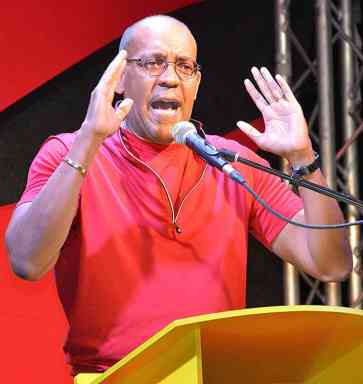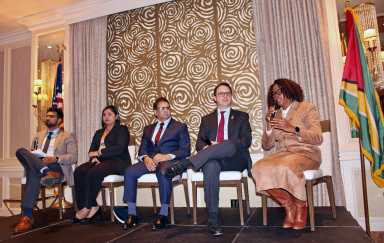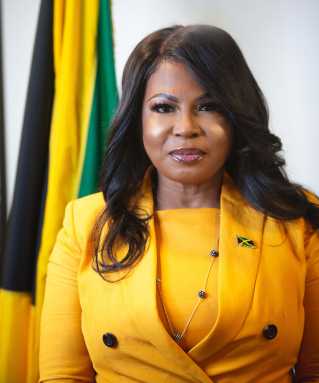Listeners:
Top listeners:
-
play_arrow
RadioJLR Just Press Play

Bahamas
Bahamas Prime Minister Phillip Davis has welcomed the US decision to open a new embassy building, saying it will serve as a daily reminder of the bond between the two countries, based on friendship, trust, and a bond that we intend to keep strong for generations to come.
“This embassy will serve as an office for official business, but also as a place where cooperation deepens, where ideas are exchanged, and where the friendship between our peoples grows stronger,” Davis said. “It will stand as a visible reminder to every Bahamian who passes by that the United States is here, a neighbour and a partner who values our relationship,” Davis added.
Washington has said that the US$225 million facility is a powerful statement of its “commitment to The Bahamas, and an investment in our collaboration in stopping illegal migration, interdicting criminals and drug smugglers, and making the Caribbean safer for Americans and Bahamians.”
Prime Minister Davis said that on Sept. 17, the US marked the 238th anniversary of the signing of its constitution, which “over time, stood as a symbol of democracy, of stability, and of a belief in the dignity of every individual.”
He said that his country is just beyond America’s southern shore, and the story of the US has always been closely intertwined with that of the Caricom country.
US President Donald Trump recently included The Bahamas among 23 countries named as major drug transit or major illicit drug-producing countries in a “Presidential Determination” submitted to Congress.
The other countries on the list include China, Afghanistan, India, Pakistan, Belize, Bolivia, Burma, Colombia, Costa Rica, the Dominican Republic, Ecuador, El Salvador, Guatemala, Haiti, Honduras, Jamaica, Laos, Mexico, Nicaragua, Panama, Peru, and Venezuela.
Barbados
Foreign Minister Kerrie Symmonds recently expressed concerns about the US military strikes on vessels suspected of drug trafficking, saying the actions may have bypassed due process and risk setting a dangerous precedent.
U.S. President Donald Trump had ordered the US military to strike a boat in the Caribbean Sea, off Venezuela, killing 11 people, allegedly carrying drugs, and recently told reporters from the Oval Office that he had strong evidence that the latest boat in which three people were killed was also carrying drugs.
In an interview with the online publication, Barbados Today, Symmonds said that while the Caribbean appreciates US support in intercepting suspected drug traffickers, concern has escalated “since the conduct of the two military strikes on vessels in the region’s water.
“This, as far as I am concerned, is a matter that ought to be treated in the context of a discussion about preserving the rule of law. I believe that most people in this region would agree that we would much prefer to see suspected criminals being identified and interdicted,” he said.
“Folks who are suspected are usually arrested, tried, and if convicted, they are sentenced. It is a dangerous and very slippery slope for all of us, if we choose to follow a path where we arbitrarily determine that circumstances point to guilt and that, therefore, an assassination should take place.”
The minister said that in no Caribbean country is there any practice of suspects being executed without any reference to what those facing the execution may have to say in their own defence.
“If any innocent people, whether from a Caribbean country or from the US or any other country, happen to be targeted and accidentally killed in this way, then we will have a most disastrous and challenging incident to contend with.
“It is for that very essential reason that I feel that dialogue is necessary. We cannot seek to uphold the rule of law and be seen to be desecrating it at the same time. This is a deeply troubling issue that is crying out for careful consideration.”
Caricom foreign affairs ministers have sent a joint letter to US Secretary of State Marco Rubio, calling for assurances that any military action targeting Venezuela will not jeopardise regional stability or be undertaken unilaterally without prior consultation.
Guyana
Prime Minister Mark Phillips says he remains confident that Guyana will benefit from the country’s gas-to-energy (GTE) project, which is approximately 68% completed.
“Definitely, during the latter part of 2026, the people of Guyana will be benefiting from electricity at a reduced cost because of this project,” he said following a recent site visit, accompanied by Minister of Public Utilities and Aviation, Deodat Indar.
The contractor, Lindsayca, indicated that construction has started on several units that will house an additional 400 workers working 12-hour shifts.
A major part of this initiative is the power plant, which will use natural gas to generate electricity. Upon completion, it will deliver 300 megawatts (MW) of power to the country.
The power plant is about 74% completed.
Minister Indar said that completing the project is a campaign promise and remains “on top of the priority list” for the re-elected Irfaan Ali government.
“Our government has put in our manifesto that the electricity price has to be cut in half. This is how important this plant is to us,” he added.
The government said the project’s introduction will create the foundation for an industrial transformation in Guyana, which also includes the construction of a fertiliser plant, a glass factory, and a data centre.
Haiti
One of Haiti’s leaders recently asked the world to help his troubled country fight what he characterised as a war against relentless gang violence and widespread hunger.
Laurent Saint-Cyr, head of Haiti’s transitional presidential council, addressing the UN General Assembly in New York, said that immediate action was needed because people were dying daily across Haiti.
“Just a four-hour plane ride from here, a human tragedy is unfolding,” he said. “Every day, innocent lives are extinguished… Entire neighbourhoods are disappearing. “
“It’s important to say this: Haiti is experiencing war, a war between criminals that want to impose violence as a social order and an armed population that is fighting for human dignity and freedom,” Saint-Cyr said.
Violence between the country’s gangs and police, as well as with vigilante groups, has left more than 3,100 people dead from January to June, with another 1,189 injured, according to the UN.
The mayhem has displaced more than 1.3 million people across Haiti in recent years. In contrast, more than half of Haiti’s citizens are expected to experience severe hunger.
Last year, a UN-backed mission led by Kenyan police officers launched operations in Haiti, which was supposed to help an understaffed and underfunded local police department fight back against the gangs.
But to this day, the mission still has less than 1,000 personnel, far less than the 2,500 envisioned, and some US$112 million in its trust fund, only about 14% of the estimated US$800 million needed a year.
The US and Panama have urged the UN Security Council to authorise a new force of 5,550 in Haiti, a proposal backed by Saint-Cyr.
“It is crucial to mobilise a strong force with a clear mandate and adequate material, logistical and financial resources,” he said.
Jamaica
Jamaica’s Prime Minister Dr. Andrew Holness held a bilateral meeting with Canada’s Prime Minister Mark Carney, on the sidelines of the United Nations General Assembly on Sept. 24, during which both leaders promise to strengthen ties between their countries.
This is Holness’s first meeting with Carney since he took office in March.
Holness said Canada has played a significant role in assisting Jamaica and CARICOM.
“Jamaica is looking forward to continuing the work with Canada.”
“Canada is a major bilateral partner with Jamaica, and we have shared history, such as the Commonwealth.”
“Canada has done an incredible job in supporting Jamaica and CARICOM as a whole ton critical matters such as Haiti ….so we look forward to continuing the work,” Holness said.
The Canadian Prime Minister then commended Holness on his leadership across the region.
“We have finally met in person, but we have spoken – I have admired your work and your leadership across a huge range of issues from leadership of CARICOM, on climate leadership in our bilateral relations, and I am looking forward to further strengthening our relationship,” Carney said.
Compiled by Devika Ragoonanan
Written by: Adm
© 2025. All Rights Reserved by Radio-JLR


